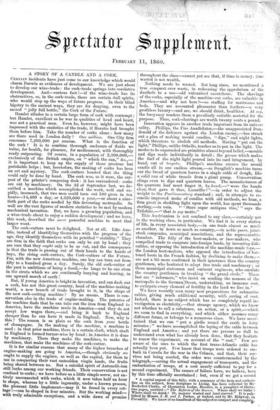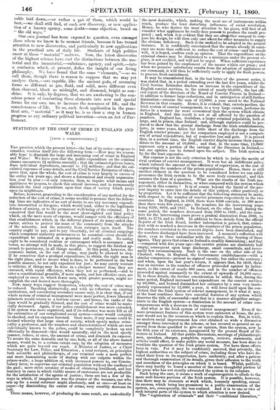A STORY OF A CANDLE AND A CORK.
CERTAIN incidents have just come to our knowledge which would charm Darwin as evidences of development. We are just about to develop our wine-trade : the cork-trade springs into corelative development. And—curious fact !—if the wine-trade has its obstrnctives, so, in the cork-trade, there are certain dull spirits, who would stop up the ways of future progress. In their blind bigotry to the ancient ways, they are for denying, even to the sacred " jolly full bottle," the Cork of the Future.
Hamlet alludes to a certain large form of cork with contempt ; but Hamlet, excellent as he was in qualities of head and heart, was not a practical man. Even he, however, might have been
impressed with the statistics of the trade, if Horatio had brought them before him. Take the number of corks alone : how many are there used in London daily ? One million. One City firm consumes 7,200,000 per annum. What is the function of the cork ? It is to combine thorough enclosure of fluids we value, for health, for pleasure, for medicament, with thoroughly ready outpouring. Of course, in a population of 2,300,000,— exclusively of the British empire, on " which the sun," &c.,— it is important to keep up the supply of these precious but perishable helps ; but, heretofore, the making of corks has been an art and mystery. The cork-cutters boasted that the thing could only be done by hand. The cork was, as it were, the out- post of the printer's composing desk : it has surrendered: corks are cut by machinery. On the 3d of September last, we de- scribed a machine which accomplished the work, well and ra.. pidly, insomuch, that two men could turn out 100 gross in ten hours-14,400 a day, or 4,320,000 a year,—or about a nine- tieth part of the corks needed by this devouring metropolis. So well are the vast figures of modern statistics to be met by modern mechanical invention. But, we have a growing population, and a wine-trade about to enjoy a sudden development ; and we have, this week, described the more powerful machine to meet that larger want.
The cork-cutters must be delighted. Not at all. Like Aus- tria, instead of identifying themselves with the progress of the age, they identify themselves with its petrified " stability." They are firm in the faith that corks can only be cut by hand ; they are sure that they ought only to be so cut, and the consequence is that the trade is passing out of their hands to the hands of boys, the rising cork-cutters, the Cork-cutters of the Future. For, with the new American machine, one boy can turn out from fifty to a hundred gross a day. Surely, the old cork-cutter of the past is ambitious of being a fossil,—he longs to be one atom in the strata which we are continually burying and leaving, in our upward march of earth !
But, if young America is bright in invention, and can dash out a cork, has not this great country, head of the machine-making world, a new branch of trade brought to it, in the shape of the new cork-cutting machine ? By no means. There is con- servatism also in the trade of engine-making. The patentee of the machine finds that he can take out the iron from England to America, have the machine made in America—and they do not accept low wages there,—and bring it back to England cheaper than he can have it made in England. Now, why is this ? The reason is as plain as the cork from your bottle of champagne. In the making of the machine, a machine is used ; in that prior machine, there is a certain shaft, which shaft in England is formed turner-wise by hand ; in America it is done by machinery. There they make the machines, to make the machines, that make the machines of the cork-cutter.
It is for similar reasons that many of the higher branches of engine-making are going to America,—though obviously we ought to supply the engines, as well as the capital, for them to use in conquering their vast untrodden virgin lands, the fruits being shared between us. But a suicidal spirit of Antonelli-ism still lurks among our working friends. Their conservatism is not confined to corks ; we have before us a little simple screw, not en- tirely unconnected with corks, which it now takes half an hour to shape, whereas by a little ingenuity, under a known process, the pleasant little implement--may it be found in every cot- tage !—can be shaped in four minutes. But the working mind— with truly admirable exceptions, and a wide dawn of promise throughout the class—cannot yet see that, if time is money, time wasted is not wealth.
Nothing needs be wasted. Not long since, we mentioned a true conquest over waste, in redeeming the opprobrium of the dusthole to a use—old vulcanized caoutchouc. The shavings of the corks, especially of the machine-cut corks, are valuable in America—and why not here ?—as stuffing for mattresses and beds. They are accounted pleasanter than feathers—a very profitless luxury—and are, we should think, healthier. At sea, the buoyancy renders them a peculiarly suitable material for the purpose. Thus, cork-shavings are worth twenty cents a pound.
Innovation appears in another trade important from its univer- sality. Phillips, the Fire Annihilator,—the unappreciated Dun- donald of the defences against the London enemy,—has struck out a plan of making mould candles, " dips," and night lights, which threatens to abolish old methods. Having " put out the light," Phillips, unlike Othello, teaches us to put in the light. The modes to be superseded are primitive almost beyond belief,—moulds and dips made individually in detail ; the grease which makes the fuel of the night light poured into its card integument, by hand, out of teapots. Phillips's machine creates the mould candle all in one endless stream,—as Dauglish's machine turns out the bread of quartern loaves in a single cable of dough, like a solid run of white treacle from a giant pump. Conservatism clings even to dips and quarters loaves. The manufacturers of the quarters loaf must finger it, by hand,—" were the hands clean that gave it thee, Lazarillo ? "—in order to adjust the weight to the Parliamentary standard ; and, in attempts to re- concile improved make of candles with old methods, we hear, a firm great in shedding light upon the world, has spent thousands sterling,—in vain. " Stare super antiquas vias,' " says the Trilobite,—" that is my motto."
This Austrianism is not confined to any class,—certainly not to the working class, in particular. We find it in every station of life, in every associated body,—in one trade almost as much as another, in town as much as country,—in noble peers, joint- stock companies, municipal associations, and the representative chamber. The folly of the boot-makers, or lace-makers, who compelled trade to emigrate into foreign lands, by inventing diffi- culties, or opposing the introduction of the machine-made tops,— the London boot-makers, who opposed the introduction of but- toned boots in the French fashion, by declining to make them,-- are not a bit more confirmed in their ignorance than the country gentlemen, who hesitated to adopt free trade and machinery ; or those municipal statesmen and eminent engineers, who emulate the country gentlemen in breaking " the grand circle." These last are " reformers," who insist on sending the manure of the metropolis to the German:Ocean, undertaking, an immense cost, to extirpate every element of fertility in the land we live in.* We have recently seen many new preparations for submarine cables, giving much additional security, with ,saving of cost. Indeed, there is no subject which has so completely repaid in- vestigation as electricity,—that strange agency, which we know not whether to call a substance, an action, or a spirit,—which we seem to find in everything, and which either assumes many different forms, or belongs to a numerous class. We have ascer- tained that we can " put a girdle round the earth in forty minutes ; " we have accomplished the laying of the cable between England and America ; and yet there are persons so dull to understand even what has already been done, that they hesitate to renew the experiment, on account of the " cost." Few are aware of the uses to which the first trans-Atlantic cable has actually been put. Few know that troops were ordered to em- bark in Canada for the war in the Crimea, and that, their ser- vices not being needed, the order was countermanded by the telegraph,—saving the actual engagement of transports, and the embarkation of troops, at a cost nearly sufficient to pay for a second experiment. The causes of failure have, we believe, been by this time officially ascertained ; but, even if we get a second
a A capital exposi of this folly, with a summary of the facts and authori- ties on the subject, from Scripture to Liebig, has been collected by Mr- Rochefort Clarke, of Chesterton Lodge, Bicester, in a pamphlet of thirty-
two pages, entitled—" The Reform of the Sewers. Where shall we bathe ? Where shall we drink ? Or, mime wasted and land starved." It is pub- lished by Messrs. J. H. and J. Parker, at Oxford, and by Mr. Ridgway, in Piccadilly. We know of no handbook of the subject so compact and completiv
cable laid down,—or rather a pa:‘ of them, which would be best,—we shall still find, at each sew discovery, or new applica- tion of a known agency, some doubt—some objection, based on " the old ways."
Our own journal has been exposed to question, even amongst those whew we know to be earnest friends, because it has turned attention to new discoveries, and particularly to new applications in the practical arts of daily life. Students of high politics sneer at these " material " matters. Now, the latest discoveries of the highest science have east the distinctions between the ma- terial and the immaterial,—substance, agency, and spirit,—into a confusion which, at present, defies the insight of our living philosophy, We have found that the same " elements,"—as we call them, though there is reason to suppose that we may yet analyze them,—are capable, like the ancient gods, of assuming forms so different as gas, fluid, and solid, more different even than charcoal, black as midnight, and diamond, bright as sun- shine. It is only, by degrees, that we are awakening to the con- scious power of converting these elements into new and special forms for our own use, to increase the resources of life, and the consciousness of life. To us, each fresh application in the prac- tical arts, " material " as it may be, is as clear a step in human progress as any ordinary political invention—even an Act of Par- liament.































 Previous page
Previous page